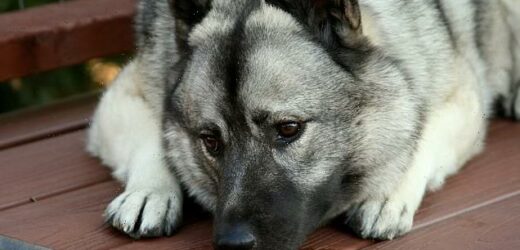Man’s STRESSED friend: Dog owners pass their anxiety on to their pooches – but only if they have a strong relationship
- Swedish scientists experts stress in two dog types – ancient and solitary hunting
- Long-term stress in the dogs was liked to the owner-dog relationship, they found
- The team suggests stress can be passed from human and dog like a ‘contagion’
- But this stress ‘synchronicity’ is stronger for the most cooperative dog breeds
A strong relationship between a dog and owner means stress can be passed between them like a ‘contagion’, a new study shows.
Swedish experts investigated stress levels in two types of dogs – solitary hunting breeds and ancient dog breeds – and their owners.
In both dog types, the stronger the relationship the human and dog had, the more stress was ‘synchronised’ between the two of them, they found.
Additionally, the owner’s personality affected the stress level in hunting dogs – but not in ancient dogs.
Swedish experts investigated stress levels in two types of dogs – solitary hunting breeds and ancient dog breeds – and their owners. Pictured, a Norwegian elkhound – a type of solitary hunting breed
The study has been conducted by a team of experts at Linköping University, Sweden, which found a link between stress in herding dogs and their owners two years ago.
Herding dogs are known for their acute ability to cooperate with humans – so researchers wanted to extend their research to other, less cooperative breeds.
‘In our previous study we found dogs of the herding breed group to synchronise with their owners in long-term stress,’ they say in their paper.
‘The aim of this [new] study was to investigate dogs that are not selected or used specifically for human cooperation in order to reveal possible origins of this, so far unique, interspecies stress contagion.
‘Results suggest that the long-term stress synchronisation is influenced by the recent selection for human cooperation, but that the human-dog relationship and personality traits are important features.’
For their study, researchers collected hair from both dogs and owners, and measured levels of cortisol within.
SUBTLE SIGNS OF STRESS IN DOGS
Subtle signs your dog might be stressed include:
– Yawning – unless your dog is tired
– Excessive panting – often with a curled tip of their tongue
– Pacing back and forth
– Licking lips when not eating/drinking
– Ears pinned back, perhaps with their head down or turning away
– Dilated pupils or red around the eyes
– Whites of eyes showing (whale eye)
– Lifting up their paw
Cortisol, a key stress hormone, is released into the bloodstream and absorbed by hair follicles in response to stress.
Researchers recruited dogs belonging to two types, along with their owners – 18 solitary hunting breeds and 24 ancient dog breeds.
As the name suggests, solitary hunting breeds are breeds that have been bred for independent hunting, and include the Swedish elkhound, the Norwegian elkhound, and the dachshund.
Ancient dog breeds, meanwhile, are genetically more closely related to the wolf than other breeds, and include the shiba inu, the basenji and the Siberian husky.
All 42 owners completed questionnaires about their own personality, consisting of 44 statements rated on a five-point Likert scale.
They also completed the the dog personality questionnaire (DPQ) on behalf of their pets, which similarly consists of 75 questions rated from one to five.
DPQ assesses five different factors – activity/excitability, responsiveness to training, aggression towards people, aggression towards animals and fearfulness.
The owners also answered questions about their relationship with their dog, including how much time they play with and reward them.
Shiba inu – a breed of hunting dog from Japan. The study has been conducted by a team of experts at Linköping University, Sweden, which found a link between stress in herding dogs and their owners in 2019
Owners were also asked about their degree of emotional attachment to the dog and the extent to which owning a dog gave rise to problems.
By analysing hair cortisol concentration (HCC), researchers could assess similarities between stress levels of the dogs and their owners.
For example, a high HCC in both owner and animal would suggest stress can be transferred from the former to the latter, through their emotional bond – or even the other way around.
‘The results showed that the owner’s personality affected the stress level in hunting dogs, but interestingly enough not in the ancient dogs,’ said study author Lina Roth at Linköping University.
‘In addition, the relationship between the dog and the owner affected the stress level of the dogs.
‘This was the case for both types, but the result was less marked for the ancient dogs.’
In their previous study published in 2019, the research team looked at dogs of two herding breeds – Shetland sheepdogs and border collies.
Herding breeds, famously used to herd livestock, have been genetically selected for their ability to collaborate with humans.
In this older study, researchers found HCC of both these breeds was significantly affected by the human personality traits neuroticism, conscientiousness and openness.
So taking both studies into account, hunting dogs show clear links between both the personality of the owner and their relationship to the dog.
But it is only herding dogs that demonstrate the unique synchronisation with the long-term stress in the owner.
‘We believe that the synchronisation of stress is a consequence of breeding the herding dogs for collaboration with people, while the relationship to the owner and the owner’s personality are important parameters that influence the synchronisation of stress levels’, said Roth.
The new study has been published in Scientific Reports.
Vets reveal the subtle signs that your dog might be STRESSED – including licking their lips, pinning their ears back and giving you ‘whale eyes’
Subtle signs of stress that an owner can miss or misinterpret are excessive panting, pacing back and forth, licking lips (when not eating or drinking) and pinning its ears back
Animal charity Blue Cross has warned dog owners to be on the lookout for signs that their pup is stressed, which it says can lead to behavioural issues.
Obvious signs a dog is stressed include a loss of appetite, aggression, having its tail between its legs or backing away from someone or something, Blue Cross says.
Subtle signs of stress that are more easily missed include excessive panting, pacing back and forth, a dog licking its lips when not eating or drinking, and pinning its ears back.
The UK charity is concerned that thousands of dogs could be sold or abandoned if the signs of stress are misinterpreted as a personality defect.
Blue Cross also fears some dogs may be stressed and develop behavioural issues as routines start to change at home when the Covid 19 lockdown ends.
Read more: Vets reveal the subtle signs that your dog might be stressed
Source: Read Full Article





